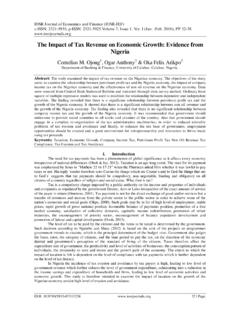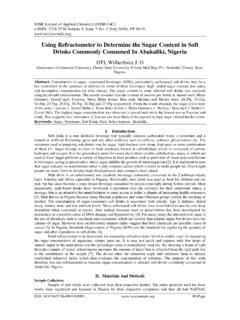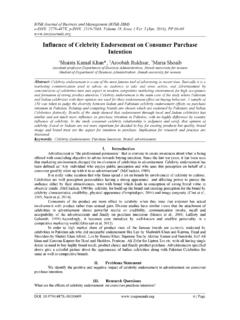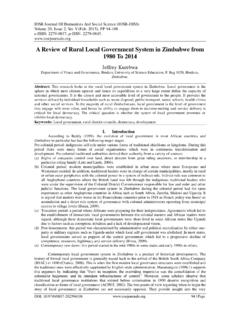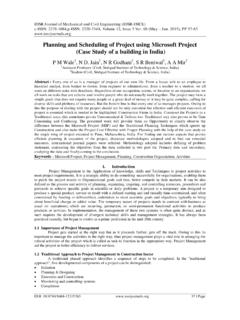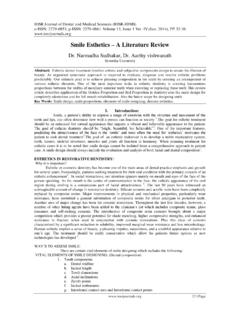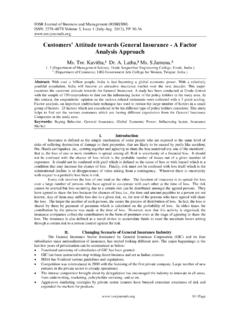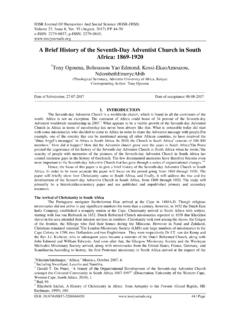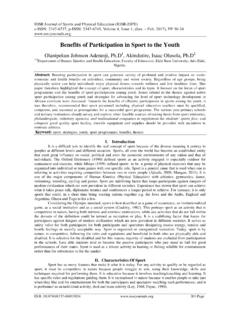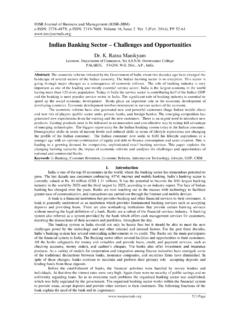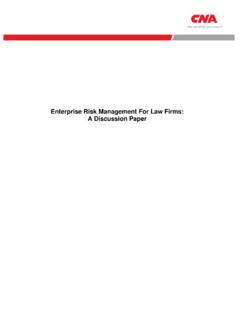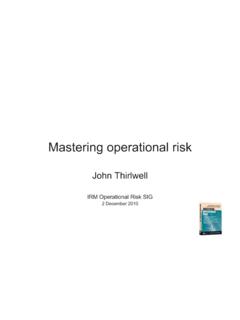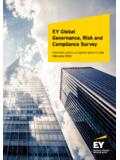Transcription of Influence of Internal Control Systems on Fraud Risk ...
1 IOSR Journal of Business and Management (IOSR-JBM) e-ISSN: 2278-487X, p-ISSN: 2319-7668. Volume 18, Issue 4 .Ver. III (Apr. 2016), PP 28-34 DOI: 28 | Page Influence of Internal Control Systems on Fraud Risk Management among Commercial Banks in Kisii Town, Kenya Makori Redemptor Gesare1, Dr. Nyagol Michael (Co-Author) 2, Dr. Ajowi Jack Odongo (Co-author)3 1 School Of Business And Economics, Jaramogi Oginga Odinga University Of Science And Technology. 795-40200, Kisii, Kenya 2 School of Business and Economics, Jaramogi Oginga Odinga University of Science and Technology 210, Bondo, Kenya 3 School of Education, Jaramogi Oginga Odinga University Of Science And Technology.
2 210, Bondo, Kenya Abstract: The banking system in Kenya has increasingly reported losses arising from frauds. Prior studies investigating the cause of these frauds have failed to link the role of Internal Control Systems (ICS) on Fraud risk management. This study sought to assess the Influence of ICS on Fraud risk management among banks in Kisii town. The study targeted all the 15 banks in the town and the respondents were stratified into three categories comprising of 15 branch managers, 74 departmental managers, and 68 clerks.
3 Saturated sampling method was used for the branch managers while simple random sampling was employed to select a third of the rest of the respondents giving a sample size of 130 respondents. Interview schedules and questionnaires were used to solicit information from the respondents. Collected data was descriptively analyzed by using weighted means and standard deviations and inferentially by use of Pearson s correlation and regression analysis with the help of Statistical Package for Social Sciences (SPSS). The study findings revealed that ICS Influence of Fraud risk management; Control environment positively and significantly influences Fraud risk management ( = ; p < ) and risk assessment positively and significantly influences Fraud risk management ( = ; p < ).
4 The study will be significant to policy makers, bank managers and academic researchers. The study recommends that the management of banks seal all loopholes that may create opportunities for undermining of Internal Control Systems by putting in place tight Fraud handling policies; put in place policies on lifestyle audits; report all employee related frauds to relevant investigative authorities and take a pro-active and dynamic risk assessment approach. Keywords: Internal Control Systems , Fraud Risk Management, Banks. I. Introduction The Internal Control system (ICS) is a major part in any organization.
5 The Committee of Sponsoring Organizations (COSO, 1994) defines Internal Control thus: Internal controls are put in place to keep the company on course toward profitability goals and achievement of its mission, and to minimize surprises along the way. They enable management to deal with rapidly changing economic and competitive environments, shifting customer demands and priorities, and restructuring for future growth According to Gamage et al. (2014), Internal Control is the process designed and affected by those charged with governance, management and other personnel to provide reasonable assurance about achievement of an entity s objectives with regard to reliability of financial reporting, effectiveness and efficiency of operations and compliance with applicable laws and regulations.
6 The ICS is designed and implemented to address identified business risks that threaten the achievement of the organization s objectives Abiola (2013), assert that the concept of Internal Control (IC) is very important for proper management of an organization s risk, which may constitute barriers to the attainment of its set objectives if neglected. Poor controls lead to scandals, losses, failures and damage,to an organization s reputation and that where new ventures are undertaken without a means of controlling risks , then problems are likely.
7 ICS are regarded as effective when they promote efficiency, reduce risk of asset loss, deter and detect errors, Fraud and theft and help to ensure the reliability of financial statements and compliance with laws and (Manass eh, 1993) Many of the previous studies have focused on finding the impact of ICS on performance of organizations in general without looking at the individual contribution of the ICS components. The current study looks at the ICS from the perspective of the Control environment and risk assessment in relation to Fraud risk management in banks.
8 Whittington et al (2001) observe that Control environment is the attitude toward Internal Control and Control consciousness established and maintained by the management and the employees of an organization. Influence of Internal Control Sysytems on Fraud Risk Management among Commercial Banks in .. DOI: 29 | Page Management philosophy and operating style, the integrity and ethical values of personnel that creates and administers controls and the board of directors sets a basis upon which other controls operate hence determines the quality of controls.
9 Palfi (2009), assert that it may be viewed as the foundation for all other components of Internal Control as it sets the tone of the organization, influencing the Control consciousness of its people, providing discipline and structure. This environment is basically influenced by the integrity and ethical values of those in leadership positions within the organization and reflected in the tone set by top management. Millichamp (2002) describes Control environment as the overall attitude, awareness and actions of directors and management regarding Internal controls and their importance in the entity.
10 Factors affecting the Control environment include management's philosophy and operating style, integrity and ethical values, a commitment to the competence, board of directors or audit committee, organizational structure, assignment of authority and responsibility and human resource policies and practices respectively (Gamage et al, 2014). Palfi (2009), posit that risk assessment is the organization s identification and evaluation of how risk might affect its achievement of objectives hence determine the most appropriate Internal controls required to manage these risks .
